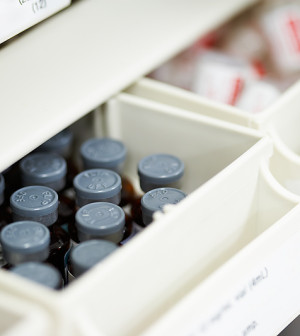- Could Your Grocery Store Meat Be Causing Recurring UTIs?
- Are You Making This Expensive Thermostat Error This Winter?
- Recognizing the Signs of Hypothyroidism
- 10 Strategies to Overcome Insomnia
- Could Artificial Sweeteners Be Aging the Brain Faster?
- Techniques for Soothing Your Nervous System
- Does the Water in Your House Smell Funny? Here’s Why
- Can a Daily Dose of Apple Cider Vinegar Actually Aid Weight Loss?
- 6 Health Beverages That Can Actually Spike Your Blood Sugar
- Treatment Options for Social Anxiety Disorder
FDA Approves ‘Abuse-Resistant’ Narcotic Painkiller


Seeking to make it tougher for people to misuse prescription painkillers, the U.S. Food and Drug Administration on Thursday approved a new hydrocodone tablet that’s designed to help thwart abuse.
Hydrocodone — best known by the brand name Vicodin — is a powerful opioid painkiller that has been tied to a surge in dangerous addictions across the United States.
The FDA said that newly approved Hysingla ER (hydrocodone bitartrate) is an extended-release tablet to treat pain severe enough to require daily, round-the-clock, long-term opioid treatment that can’t be eased by other pain medications.
The drug is not approved for “as-needed” pain relief, the agency said.
Hysingla has features that are expected to reduce, but not prevent, abuse of the drug. According to the FDA, the tablet is difficult to crush, break or dissolve, making it tougher for abusers to snort or inject it.
“While the science of abuse deterrence is still evolving, the development of opioids that are harder to abuse is helpful in addressing the public health crisis of prescription drug abuse in the U.S.,” Dr. Janet Woodcock, director of the FDA’s Center for Drug Evaluation and Research, said in an agency news release.
She added that the FDA has had to balance the need for effective pain relief for patients against concerns about the growing epidemic
of prescription painkiller abuse.
In August, the FDA announced new controls on painkillers containing hydrocodone. Under those rules, patients will only have access to a three-month supply of the drug and will have to see a doctor to get refills.
About 22 million Americans have misused prescription painkillers of various kinds since 2002, according to a U.S. Substance Abuse and Mental Health Services Administration report. Prescription painkillers now rank only behind marijuana as a drug of abuse in the United States, the agency said.
Today’s approval “will better enable the agency to balance addressing this problem [of painkiller abuse] with ensuring that patients have access to appropriate treatments for pain,” Woodcock said.
One expert said painkiller addiction is a growing concern in the United States.
“Prescription drug abuse continues to be rampant in many areas of the country and is associated with high mortality rate,” said Dr. Scott Krakower, assistant unit chief in psychiatry at Zucker Hillside Hospital in Glen Oaks, N.Y. “In addition, there are decreased perceptions of harm to these agents, especially with hydrocodone products.
“As we move forward in research with new drug development for addiction and pain medicine, we should continue to find agents that will both effectively relieve pain and reduce the potential for abuse,” he added.
According to the FDA, different versions of Hysingla contain 20, 30, 40, 60, 80, 100 and 120 milligrams of hydrocodone to be taken every 24 hours. The drug does not carry the serious liver toxicity risks associated with painkillers that contain both hydrocodone and acetaminophen, the FDA noted. The most common side effects reported by users included constipation, nausea, fatigue, upper respiratory tract infections, dizziness, headaches and drowsiness.
As part of the approval, Connecticut-based Purdue Pharma must also conduct postmarketing studies of Hysingla, to assess the effectiveness of its abuse-deterrent features.
More information
The U.S. National Institute on Drug Abuse has more about prescription drug abuse.
Source: HealthDay
Copyright © 2026 HealthDay. All rights reserved.










